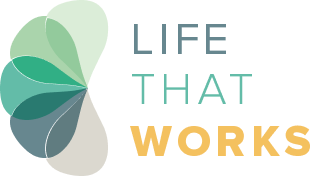
Coaches and therapists can be incredibly valuable assets in your personal growth journey. While both types of professionals can help you improve your life, they do so in different ways. Discover the key differences between life coaching vs therapy to decide who is the right professional for you and your needs.
Is Coaching the Same Thing as Therapy?
Life coaching and therapy are two very different practices. While both can be beneficial, pursuing life coaching vs therapy depends on your needs and goals. If you’re struggling with prevalent mental health issues, like depression, anxiety, OCD, suicidal thoughts, panic attacks, PTSD symptoms, or the like, I encourage you to seek help from a licensed professional counselor.
However, if you’re facing big decisions regarding your relationships or career or feel paralyzed when it comes to achieving your desires and goals, a life coach can empower and motivate you in ways you’ve never experienced before. As a certified life coach, I use a blend of coaching approaches and analytical tools to help my clients learn more about themselves to thrive in every area of their lives!
What’s the Difference Between a Life Coach vs Therapist?
Coaching and counseling are both amazing tools for improving your life, but they’re not interchangeable. Here are three key differences between life coaching vs therapy.
1. Life Coaching vs Therapy: The Focus
A life coach generally focuses on the present and future. A therapist can have a heavy emphasis on the past. A therapist understands trauma and mental health and is trained to help you address deep-rooted issues in a therapeutic environment and receive the support needed to work through issues that have blocked you from living optimally. During a counseling session, your therapist is trained to help you dive deep into your past experiences. They help you recognize reactions and behaviors that show up in your life that are holding you back. This is especially beneficial for those who experienced unresolved or unrecognized trauma in their childhood or seek to understand diagnosed mental health issues.
During a life coaching session, your coach works with you as a naturally creative, resourceful, whole human being. As your coach, I am not “fixing” you or diagnosing; instead, the attention is on who you are today and how you want to grow, change, and improve. With a focus on your inner BEing, you can begin to find fulfillment and alignment with your unique purpose. Life coaching centers on what makes you thrive and show up as your best self while identifying and finding solutions to any obstacles to living the life you desire.

2. Life Coaching vs Therapy: The Questions
Because the overall focus of a life coach vs therapist is different, so are the questions asked and solutions sought. During a counseling session, your therapist will ask you about your past in relation to current situations. They will use a variety of therapeutic approaches to help you become more aware of underlying thinking that is creating challenges in your life today.
During a life coaching session, on the other hand, your coach will focus on questions about your BEing, guiding you to recognize your own potential and co-creative nature with powerful witnessing and questioning like:
- Who am I?
- How am I showing up?
- How do I want to show up?
As a life coach, these questions are the foundation of the work I do with clients. It is essential to gain clarity on who you are–your BEing. It is intrinsic in each of us, and getting better connected with this wisdom and truth is where you will find purpose and fulfillment. When you know who you are, what you value, and how to show up as your true self, daunting decisions become clear, tricky relationships become easier to navigate, and career choices become achievable. Knowing what is most important to you and your core values and intentions is a critical foundation.
3. Life Coaching vs Therapy: The Outcome
Seeking life coaching vs therapy depends on what you hope to gain from the sessions. Therapists are trained and skilled at listening and holding space to share past traumas and current emotions without judgment. The outcome is often a greater acceptance of the experiences that shaped who you are today, leading to relief from some mental health conditions like depression and anxiety. Life coaches, on the other hand, act as a guide to help you discover more about yourself and take action in your present to impact your future positively.
When I reflect on difficult times in my life, I realize the best answers always come from within–within my own wisdom and values that guide me to the right next step. As a life coach, I help you connect with and trust yourself to lead you to the right decision for you, regardless of what others say you should or shouldn’t do. The outcome, then, is entirely dependent on what resonates with you as the best option for moving forward in specific areas of your life. The answers are within you–I simply help you dive deep to discover, trust, and live them.
So, Which is Better: a Life Coach vs Therapist?
The good news is that one is not better than the other. Whether to pursue life coaching vs therapy is a very personal decision based on your current struggles and desired outcomes. It’s important to ask questions and tune into what feels right for you. If you’re questioning whether you need a life coach vs therapist, here are some things to do and questions to consider:
- A little goes a long way, so look for a professional with proper credentials and experience. Ask for references from those you trust.
- When vetting a therapist or coach, pay attention to how you feel and respond to the initial conversation (your intuition will help guide you).
- Ask yourself:
- Am I experiencing bigger depths, swings of emotions and/or unhealthy and maladaptive behaviors, chronic negative self-talk, or ruminating thoughts that don’t feel like myself? If so, consider a therapist.
- Am I seeing more conflict or isolation in my relationships, career, or family? If so, consider a life coach.
- The frequency and duration of challenges and pain points are other good indicators of your needs. Everyone has bad days and periods of life where they feel stuck and uncertain. If these feelings are constant and keep you from participating in everyday activities, a therapist might be the best place to start.
- In general, if you …
- Have a strong sense of self-awareness
- Can recover quickly from the ups and downs of life
- Have a secure support system in your life
- Have experienced counseling before and understand the difference
But you’re still questioning your purpose, wanting something more, seeking transformation and growth, and aren’t clear on the right next steps, then coaching could be just the right fit.
Discover if Coaching is Right for You
I would love to talk to you about your goals and see if we’re a good fit for each other. If so, we will work together to find your next best steps to BEing more of who you are meant to be. When you know your true self and talk to your true self with love, compassion, and appreciation, you’ll be blown away by what becomes possible in your relationships, career, and life! The environment you create for your BEing makes all the difference. Let’s talk more about it today!

Leave a Reply